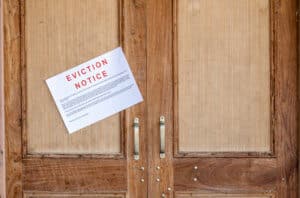If you are a landlord and you need to evict a tenant, it is important that you familiarize yourself with tenant law in Miami first. Our eviction attorneys offer advice on how to handle this situation.
Different states handle the landlord-tenant relationship differently, so it is important that if you are a landlord in Miami, you understand tenant law in Miami. The eviction process is not complicated but it does need to be followed to the letter if you want to get a tenant off of your property. Here, our eviction attorneys at Casais & Prias offer some highlights of how the eviction process works in Florida.
What Are Some Reasons For Eviction?
Before providing your tenant with a written notice, consider why you want to evict them. You must have cause to evict under Florida’s guidelines. A landlord has cause to evict a tenant for:
Non-Payment
If your tenant does not pay rent on time, the landlord can give the tenant a three-day notice that they need to pay or vacate the property. If neither action is taken in that time, the landlord can file an eviction suit.
End-Of-Lease
A landlord can evict a tenant after a lease has expired by offering a 60-day notice for a month-to-month tenancy in Miami.
Violation Of Lease Terms
When a tenant violates any of the terms of the lease agreement, it is considered grounds for eviction. Some violations, however, allow for corrective action to be taken in order to avoid eviction. Landlords must provide a seven-day notice to allow the tenant time to correct the violation or be subject to eviction.
What Are Curable Violations?
As mentioned above, some violations come with the opportunity to correct the offense and avoid eviction. These violations include, but are not limited to:
- Having an unauthorized pet
- Having an unauthorized vehicle
- Parking in an unauthorized area
- Not maintaining a standard level of cleanliness
Tenants have seven days from the date of the notice to rectify the violation. If no corrective action is taken within the seven-day period, the landlord can proceed with the eviction process.
What Are Incurable Violations?
Some violations are more serious and result in no opportunity to correct the offending behavior. These include, but are not limited to:
- Damage to the property
- Abuse of the property
- Illegal activity
What Is The Eviction Process?
Once a landlord has established that they have cause for eviction, the first step is to become familiar with the legal process to evict. Tenant law in Miami is designed to protect tenants from unlawful eviction. But the law also protects landlords which is why knowing your rights will make the process much simpler. If you have any questions along the way, our eviction attorneys can answer them.
Written Notice To The Tenant
This notice may be delivered by the landlord to the tenant in person, via mail, or posted in plain sight on the residence. The length of this notice depends on the rental contract.
- Year to year: 60 days
- Quarter to quarter: 30 days
- Month to month: 15 days
- Week to week: 7 days
File An Eviction Complaint
If the tenant does nothing to rectify the reason for eviction, the landlord can file an eviction complaint or lawsuit with the appropriate county. Florida makes it simple to file a complaint using its e-filing portal.
Tenant Is Served Summons And Complaint
Once a complaint has been filed with the county court, the Sheriff’s office will serve the tenant with a court summons and a notarized copy of the complaint. The tenant then has five days to contest the complaint in writing.
Eviction Hearing With Judge’s Ruling
The next step in the eviction process is a court hearing. Both the tenant and landlord must appear and bring any documentation they feel supports their case. If the tenant does not appear, the judge will rule in favor of the landlord.
Sheriff Gives The Tenant A Writ of Possession
If the court rules in favor of the landlord, it will issue a writ of possession. This document will be served by the Sheriff’s office to the tenant who then has 24 hours to vacate the property or be forcibly removed.
Sheriff Returns Possession To The Landlord
After the 24-hour period, the Sheriff can place a padlock on the door and if the tenant has not yet vacated the property, they can be forcibly removed.
As you can see, there are many steps in the eviction process and the rights of the landlord and the tenant must be protected. Knowing the ins and outs of tenant law in Miami will help facilitate a smooth eviction process. For questions or assistance with an eviction complaint, contact our team at Casais & Prias. We are here to help.




